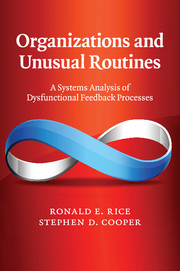Book contents
- Frontmatter
- Contents
- List of figures
- List of tables
- List of boxes
- Preface
- Acknowledgments
- 1 Crazy systems, Kafka circuits, and unusual routines
- 2 Causes, symptoms, and subroutines of unusual routines in six computer information/communication systems
- 3 Getting personal: unusual routines at the customer service interface
- 4 A multi-theoretical foundation for understanding unusual routines
- 5 A detailed case study of unusual routines
- 6 Summary and discussion of the case study results
- 7 Individual and organizational challenges to feedback
- 8 A multi-level and cross-disciplinary summary of concepts related to unusual routines
- 9 Recommendations for resolving and mitigating unusual routines and related phenomena
- 10 Summary and a tentative integrated model of unusual routines
- References
- Index
10 - Summary and a tentative integrated model of unusual routines
Published online by Cambridge University Press: 10 January 2011
- Frontmatter
- Contents
- List of figures
- List of tables
- List of boxes
- Preface
- Acknowledgments
- 1 Crazy systems, Kafka circuits, and unusual routines
- 2 Causes, symptoms, and subroutines of unusual routines in six computer information/communication systems
- 3 Getting personal: unusual routines at the customer service interface
- 4 A multi-theoretical foundation for understanding unusual routines
- 5 A detailed case study of unusual routines
- 6 Summary and discussion of the case study results
- 7 Individual and organizational challenges to feedback
- 8 A multi-level and cross-disciplinary summary of concepts related to unusual routines
- 9 Recommendations for resolving and mitigating unusual routines and related phenomena
- 10 Summary and a tentative integrated model of unusual routines
- References
- Index
Summary
The allure of unusual routines
The impetus for this work was our puzzlement at the frustrations and disappointments so commonly felt both by organization members and by outsiders interacting with complex organizations. While both of us are academicians by trade, it seemed obvious that the imperfections we perceived in organizational functioning were not unique to our personal workplaces. This is an experience the authors had shared at various academic institutions and organizations, and many others outside of academe have described to us in ordinary conversation. Interestingly, very soon after beginning to describe the phenomenon, most people would immediately relate to the concept and begin to tell their stories of dealing with URs, although before then they would have had a hard time articulating the experience, its components or complexity, and certainly would not have called them URs. Neither of us expects that the real world should perfectly conform with our individual preferences (that would be a much poorer world, indeed!) or that organizational processes should be perfectly functional or reasonable (and the criteria for that would be impossible to agree upon) – but nonetheless we both wondered just how it is that so much of everyday organizational life and interactions with organizations could seem so nonsensical. In the broadest sense, our aim has been to try to understand a subset of the imperfection of human communication behaviors within and with organizations, imperfections that might possibly be resolved or mitigated.
- Type
- Chapter
- Information
- Organizations and Unusual RoutinesA Systems Analysis of Dysfunctional Feedback Processes, pp. 331 - 343Publisher: Cambridge University PressPrint publication year: 2010



